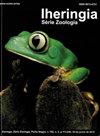在巴西东南海岸的岩石海岸对赤豆鱼胃内容物的评价
IF 0.7
4区 生物学
Q4 ZOOLOGY
引用次数: 2
摘要
巴西圣保罗州乌巴图巴(Ubatuba)的普拉亚格兰德(Praia Grande)岩石海岸是由岩石和多毛纲沙礁组成的。这些微环境为一些海洋生物提供了庇护所和觅食区,并吸引了许多游客。蟹Eriphia gonagra (Fabricius, 1781)栖息在这些结构中,可以作为生物指示物,因为它们可能受到人为活动的影响。本研究评估了一个居住在Praia Grande岩石海岸的E. gonagra种群的胃内容物和摄食习性,考虑了性别、大小和微栖息地。在1996年和1997年进行每月取样,并在岩石表面或沙礁中人工捕获螃蟹。因此,根据捕获地点(微生境),所采集标本的特征为岩石(RO)或砂礁(SR)。最丰富的食物种类是软体动物、藻类、多毛纲和甲壳类,在研究环境中观察到这些类群作为营养资源的重要性。在岩石上取样的螃蟹胃中软体动物更丰富,而其他项目在沙礁螃蟹中增加。在SR取样的标本中,多毛体是更常见的食物,表明该生物群落也被用作丰富的蛋白质来源。项目的比例也因大小不同而不同。了解这些习性对于营养需求研究、监测生物之间的关系以及评估沿海地区未来的环境影响至关重要。本文章由计算机程序翻译,如有差异,请以英文原文为准。
Evaluation of the stomach contents of Eriphia gonagra from a rocky shore in the southeastern Brazilian coast
ABSTRACT The rocky shores of Praia Grande, in Ubatuba (São Paulo, Brazil), are formed by rock and Sabellaridae polychaete sandy reefs. These microenvironments offer shelters and foraging areas for several marine organisms and attracts many tourists. The crab Eriphia gonagra (Fabricius, 1781) inhabits these structures and can be used as a bioindicator, since they may be affected by anthropogenic actions. This study evaluated the stomach contents and characterized the feeding habits of an E. gonagra population, inhabiting the rocky shores from Praia Grande, taking into account the sex, size, and microhabitat. Monthly samplings were performed in 1996 and 1997 and the crabs were manually captured on the rocky surface or into of the sand reefs. So, the specimens sampled were characterized according to their capture site (microhabitat) as rocky (RO) or sand reef (SR). The most abundant food items were Mollusca, algae, Polychaeta, and Crustacea, being observed the importance of these groups as a nutritive resource in the studied environment. Mollusks were more abundant in the stomachs of crabs sampled on the rocks, while the other items increased in the sand reefs crabs. In the specimens sampled in the SR, polychaetes were the item food more common, indicating that this biotope is also used as a rich source of protein. The proportion of items differed also between size classes. Knowledge of such habits is essential for nutritional requirements studies, monitoring relationships among organisms, as well as assessing future environmental impacts in consolidated coastal regions.
求助全文
通过发布文献求助,成功后即可免费获取论文全文。
去求助
来源期刊

Iheringia Serie Zoologia
生物-动物学
CiteScore
1.00
自引率
0.00%
发文量
12
审稿时长
6-12 weeks
期刊介绍:
The journal Iheringia, Série Zoologia, edited by the “Museu de Ciências Naturais” of the “Fundação Zoobotânica do Rio Grande do Sul”, publishes original research findings in zoology with emphasis on taxonomy, systematics, morphology, natural history, and community or population ecology of species from current Neotropical fauna. Scientific notes will not be accepted for publication. Species lists without a taxonomic approach, or that are not the result of studies on the ecology or natural history of communities will not normally be accepted. The same applies to identification keys of groups of taxa defined by political boundaries. Authors wishing to inquire about the scope of the journal or the suitability of a particular topic are encouraged to contact the Editorial Board prior to submission. Furthermore, articles with a main focus on agronomy, veterinary, zootechny or other areas involving applied zoology will not be accepted.
Its abbreviated title is Iheringia, Sér. Zool., which should be used in bibliographies, footnotes and bibliographical references and strips.
 求助内容:
求助内容: 应助结果提醒方式:
应助结果提醒方式:


